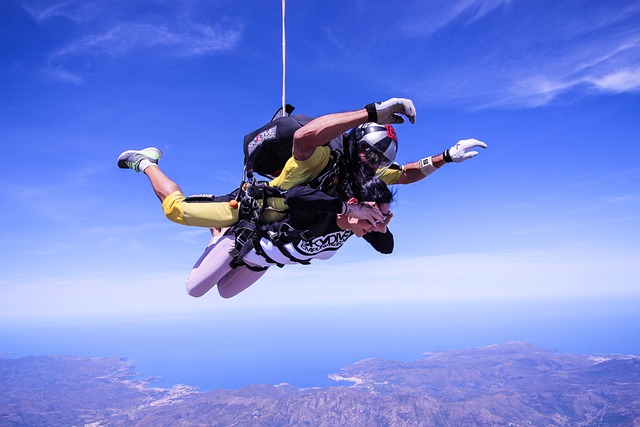Skydiving is an exhilarating activity that attracts adventure enthusiasts from all walks of life. However, for pregnant women, the question of whether skydiving is safe or advisable arises.
The answer is NO, it is generally not recommended to skydive while pregnant. Skydiving poses potential risks to the well-being of both the expectant mother and the unborn baby. The physical changes and increased vulnerability during pregnancy, as well as the potential impact of altitude changes, G-forces, and vibrations, make skydiving a high-risk activity during this time.
With the well-being of both the expectant mother and the unborn baby at stake, it is crucial to consider various factors before taking the leap. I will provide valuable insights and guidelines from medical professionals, as well as examine alternative options, such as indoor skydiving, to ensure a comprehensive understanding of the topic.
Let’s explore the safety implications and considerations when it comes to skydiving during pregnancy.
Understanding the Risks of Skydiving While Pregnant
Pregnancy brings about significant physical changes and considerations that must be taken into account when evaluating the safety of skydiving. Let’s explore the potential risks involved:
- Physical changes during pregnancy: During pregnancy, a woman’s body undergoes numerous transformations to support the growth and development of the fetus. These changes include increased blood volume, hormonal fluctuations, changes in balance and coordination, and stretching of ligaments. It is essential to understand how these changes might impact the body’s ability to handle the physical demands of skydiving.
- Impact on the fetus: The developing fetus is particularly vulnerable to external factors during pregnancy. Skydiving involves factors like rapid altitude changes, increased gravitational forces (G-forces), and vibrations, all of which could potentially affect the well-being of the baby. It is crucial to assess the potential risks associated with these factors and their impact on the fetus.
It’s important to note that due to the limited research on skydiving specifically during pregnancy, the exact risks and their extent are not well-defined. Therefore, it is necessary to consider the potential risks and exercise caution when making decisions about participating in skydiving activities while pregnant. Consulting with healthcare professionals is highly recommended to ensure a thorough understanding of individual circumstances and risks.
Expert Advice and Guidelines
When it comes to the safety of skydiving during pregnancy, it is crucial to seek guidance from medical professionals who specialize in prenatal care. Let’s explore the expert advice and guidelines provided by obstetricians and gynecologists:
- Professional opinions: Obstetricians and gynecologists, with their expertise in maternal health and fetal development, generally exercise caution when it comes to activities like skydiving during pregnancy. Their primary concern is the well-being of both the expectant mother and the unborn baby. While opinions may vary among professionals, many advise against skydiving due to the potential risks involved. They emphasize the importance of prioritizing the health and safety of the pregnancy.
- Organizational recommendations: Renowned organizations, such as the American College of Obstetricians and Gynecologists (ACOG), provide guidelines and recommendations regarding physical activities during pregnancy. While specific guidelines regarding skydiving may not exist, these organizations generally discourage engaging in activities with a high risk of falls, abdominal trauma, or excessive physical exertion during pregnancy. It is essential to review the recommendations provided by these organizations and consider them when making decisions about skydiving while pregnant.
It is important to remember that every pregnancy is unique, and individual circumstances may differ. Therefore, it is crucial to consult with healthcare professionals who can provide personalized advice based on your medical history and current pregnancy status. Their expertise will help you make an informed decision that prioritizes the safety and well-being of both you and your baby.
Skydiving Alternatives
If you’re an adventurous spirit looking for an adrenaline rush during pregnancy but want to avoid the potential risks associated with traditional skydiving, there are alternative options to consider. Let’s explore some skydiving alternatives that provide a controlled environment and reduced risks:
- Indoor skydiving and iFly: iFly is one popular company that offers indoor skydiving experiences in various locations. Indoor skydiving, also known as vertical wind tunnel flying, offers an exhilarating experience without the need for jumping from an aircraft. In a wind tunnel, powerful fans generate vertical wind speeds that simulate the sensation of freefall. This controlled environment minimizes the risks associated with traditional skydiving, making it a safer option for pregnant women.
- Exploring alternative activities: If the idea of indoor skydiving doesn’t appeal to you, there are other recreational activities that can provide a similar adrenaline rush without the potential risks of skydiving during pregnancy. Consider engaging in activities such as hiking, swimming, prenatal yoga, or taking part in low-impact fitness classes designed for pregnant women. These activities can offer a sense of adventure and physical challenge while minimizing potential risks to both you and your baby.
When considering alternative activities, it’s essential to consult with your healthcare provider to ensure they are suitable for your specific pregnancy circumstances. They can provide personalized recommendations based on your medical history and current health status, ensuring a safe and enjoyable experience.
Remember, the goal is to prioritize the well-being and safety of both you and your baby during pregnancy while still satisfying your adventurous spirit.
Skydiving While Pregnant First Trimester Considerations
The first trimester is a crucial period of fetal development, and it requires extra caution when considering activities like skydiving. Let’s explore some important considerations specific to the first trimester:
During the first trimester, the embryo is rapidly developing and undergoing critical stages of growth. Organogenesis, the process of organ formation, occurs during this time. The developing fetus is particularly vulnerable to external factors, including physical stresses and potential trauma. It is essential to be aware of the potential risks associated with skydiving during this sensitive period.
Safety precautions:
- Medical advice: It is crucial to consult with your healthcare provider before engaging in any high-risk activities, including skydiving, during the first trimester. They will evaluate your specific circumstances, including any existing medical conditions or pregnancy complications, and provide personalized guidance based on your situation.
- Potential risks: Skydiving involves sudden changes in altitude, increased G-forces, and vibrations, all of which may pose risks during the first trimester. The potential impact of these factors on the developing embryo is not well-documented, making it even more important to err on the side of caution.
- Minimizing risks: If you are considering skydiving during the first trimester, it is crucial to follow strict safety protocols and guidelines. However, it is generally advised to prioritize the safety of your pregnancy and opt for alternative activities that pose minimal risks to you and your baby’s health.
Remember, the first trimester is a critical period of development, and the well-being of your baby should be the top priority. Always seek professional medical advice, listen to your body, and make informed decisions that align with the recommendations of your healthcare provider.
Frequently Asked Questions (FAQs)
Q1: Can I skydive during the second or third trimester of pregnancy?
A: Skydiving is generally not recommended at any stage of pregnancy. The risks associated with skydiving, including altitude changes, G-forces, and potential trauma, apply throughout pregnancy. It is best to avoid skydiving during the entire duration of pregnancy for the well-being of both you and your baby.
Q2: Are there any specific risks for the baby during a skydiving jump?
A: Skydiving poses potential risks to the developing fetus due to factors like rapid altitude changes, G-forces, and vibrations. The impact of these factors on the baby is not well-documented, but caution is advised to ensure the baby’s safety.
Q3: Can I go tandem skydiving while pregnant?
A: Tandem skydiving involves being harnessed to an experienced skydiver. While it may seem like a safer option, it is still generally advised to avoid skydiving altogether during pregnancy, including tandem jumps. The potential risks associated with the activity and the well-being of both you and your baby should be prioritized.
Q4: Are there any alternative extreme sports or activities that are considered safe during pregnancy?
A: It is generally recommended to avoid high-risk activities, including extreme sports, during pregnancy. However, activities like indoor rock climbing, gentle hiking, swimming, and prenatal yoga are considered safer alternatives that can provide a similar sense of adventure and physical challenge.
Q5: What are the potential complications or risks if I do go skydiving while pregnant?
A: The potential complications or risks of skydiving while pregnant can include trauma to the abdomen, placental abruption, premature labor, and potential harm to the developing fetus. However, the exact risks are not well-documented due to limited research. It is best to prioritize the safety of your pregnancy and consult with healthcare professionals for personalized advice.
Q6: Can I do indoor skydiving or iFly during pregnancy?
A: Indoor skydiving or iFly involves simulated freefall experiences in a controlled environment. While it is generally considered safer than traditional skydiving, it is still advisable to consult with your healthcare provider. They can provide specific guidance based on your medical history and current pregnancy status.
Q7: What if I have skydived before I found out I was pregnant?
A: If you have skydived before discovering your pregnancy, it is important to inform your healthcare provider. They can evaluate your individual situation and provide guidance based on factors such as the timing of the jump, your medical history, and any potential risks associated with the activity.
Remember, each pregnancy is unique, and it is crucial to consult with healthcare professionals who can provide personalized advice based on your specific circumstances. Prioritizing the safety and well-being of both you and your baby should guide your decisions regarding skydiving or any high-risk activities during pregnancy.
Conclusion
Skydiving during pregnancy is a topic that requires careful consideration of the potential risks and the well-being of both the expectant mother and the unborn baby. While the exact risks associated with skydiving during pregnancy are not well-defined due to limited research, it is crucial to prioritize safety and make informed decisions.
Understanding the physical changes that occur during pregnancy and the potential impact on the fetus is essential. Expert advice and guidelines provided by obstetricians and gynecologists caution against skydiving during pregnancy due to the potential risks involved. Renowned organizations like the American College of Obstetricians and Gynecologists (ACOG) generally discourage high-risk activities during pregnancy.
Fortunately, there are skydiving alternatives available, such as indoor skydiving or iFly, which provide a controlled environment with reduced risks. Additionally, engaging in alternative recreational activities like hiking, swimming, or prenatal yoga can offer a similar adrenaline rush while minimizing potential risks.
During the first trimester, when the fetus is undergoing crucial development, extra caution is necessary. The potential risks and limited research make it advisable to avoid skydiving during this sensitive period. It is important to consult with healthcare professionals who can provide personalized advice based on your specific circumstances.
In conclusion, when it comes to skydiving during pregnancy, it is crucial to prioritize the safety and well-being of both you and your baby. By seeking expert advice, considering alternatives, and making informed decisions, you can enjoy a fulfilling and adventurous pregnancy while minimizing potential risks.
Here’s your next read: Can You Do Gardening When Pregnant?








